2020-08-15:
ID 65125
20:25:06 UT
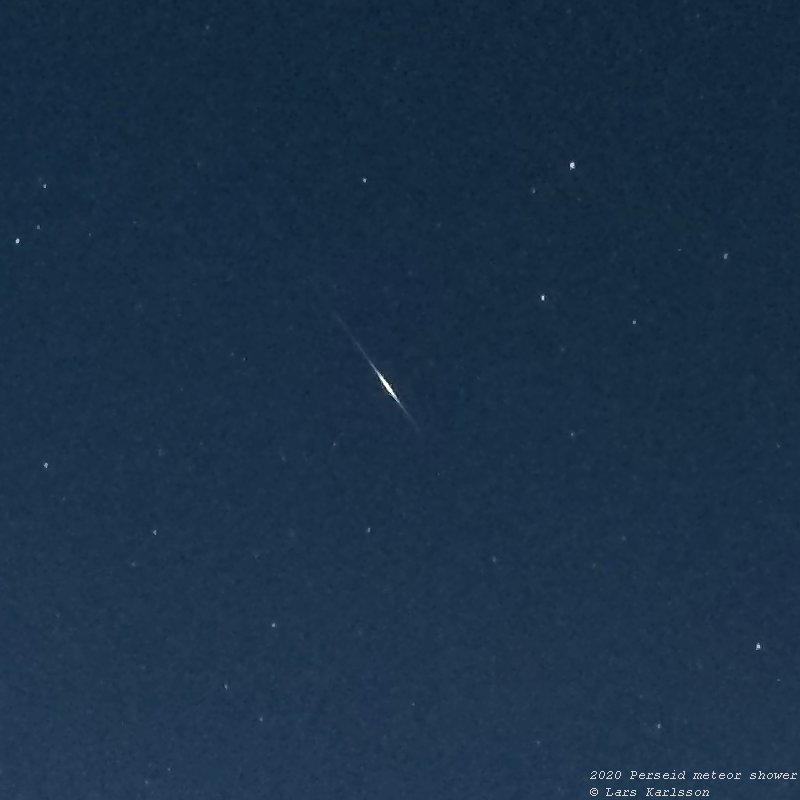
This could be a satellite, when it rotate the solar panel create reflections from the Sun.
|
ID 65130
20:26:51 UT
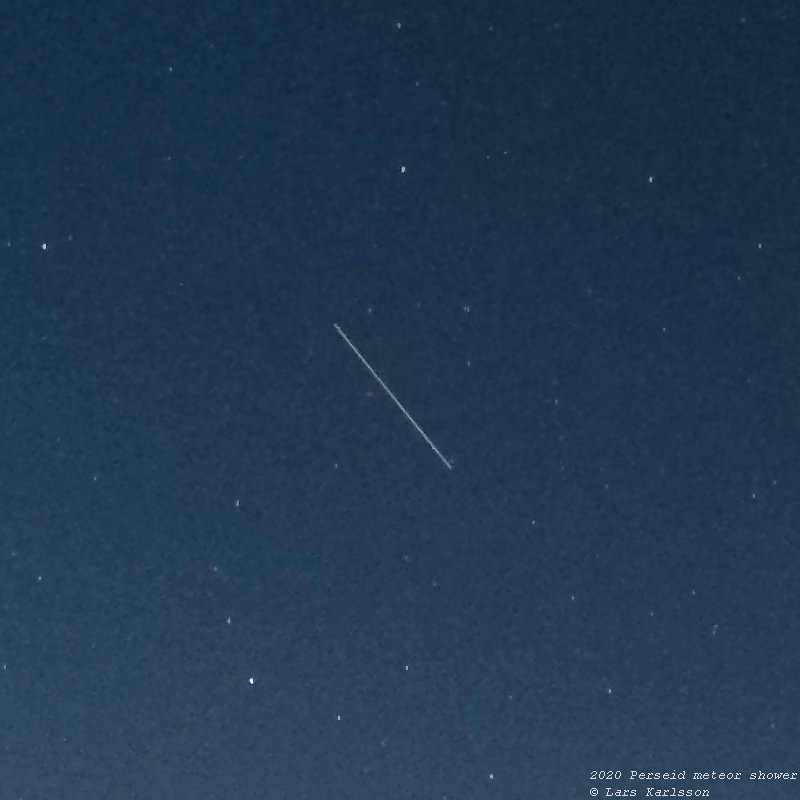
A typical satellite track, it lasted for five images and was very bright.
Sometimes they blinking because of its rotation.
|
ID 65255
21:10:41 UT, full width 180 degree.
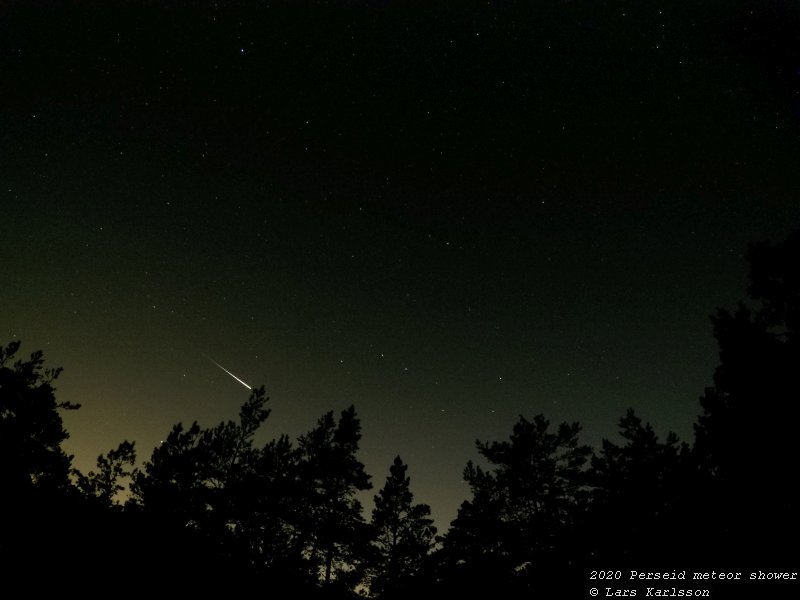
This night we saw a lot of bright meteors, most of them was not Perseids but others.
But what did we catch on our cameras ?
This one is special, I think it's a Iridium flash, reflection in a satellite's solar panels.
They are communication satellites in low orbit.
What we see is only the half track, the other half is on next photo, 20 seconds later.
A flash last for a couple of seconds.
A bit below the center you see the constellation Big Dipper.
Draw a line upwards from the two most right stars of Big Dipper and you find the star Polaris.
Compare with a Star Chart.
|
ID 65255 + 65256
21:11:01 UT
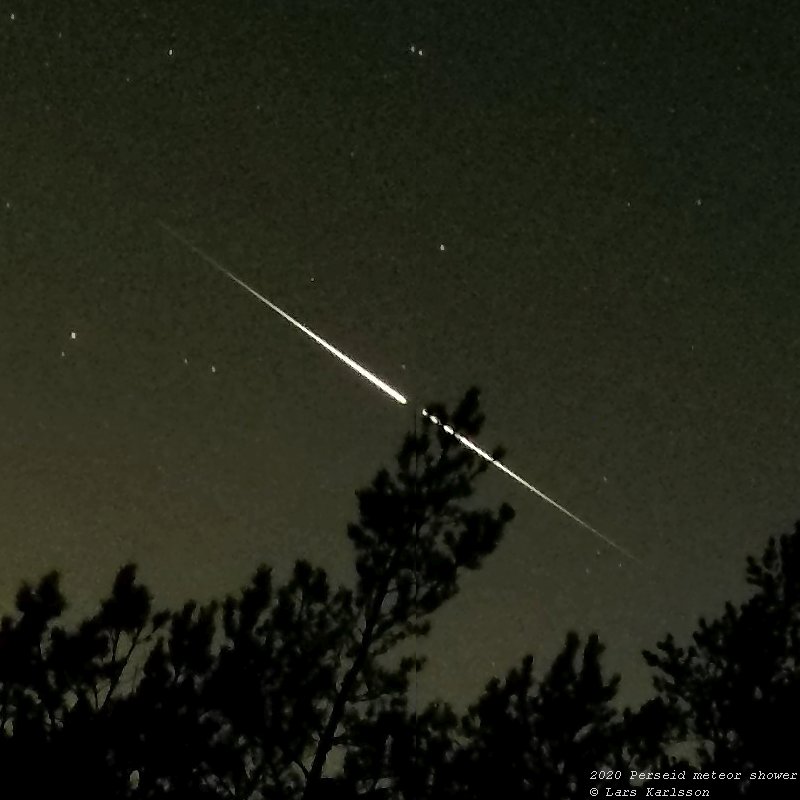
A composite of two images taken 20 seconds apart and cropped from above.
The photos are a bit rotated because of Earth's rotation.
I have to ask a specialist on satellites if I'm correct that it is a Iridium satellite.
My friend Björn Gimle can recognize satellites.
I come back later with the answer.
|
ID 65508
22:39:20 UT
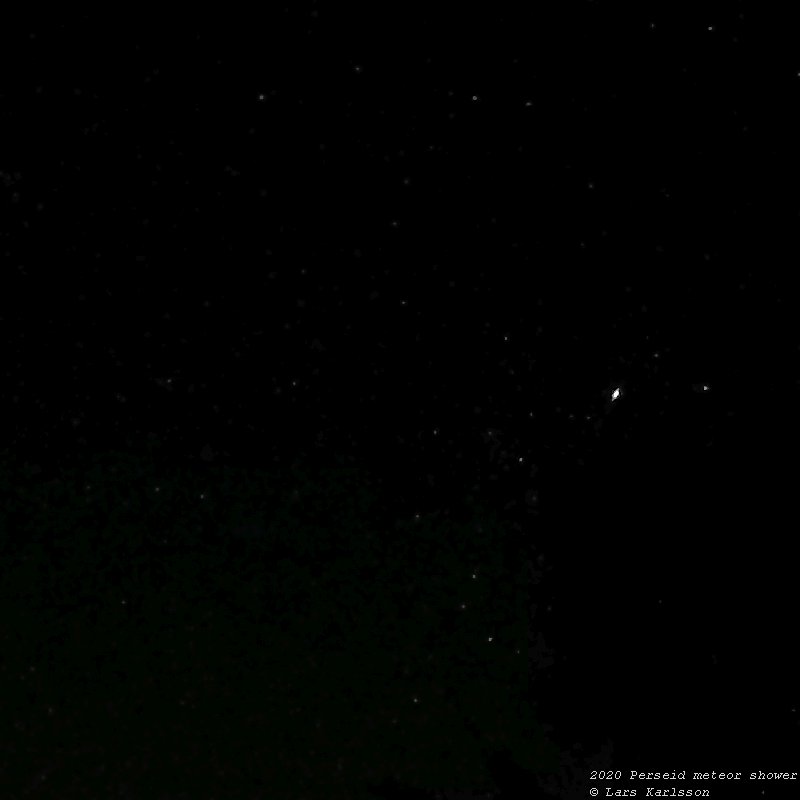
This is probably a Perseid meteor, not far from the origin.
When they are close to the origin they are not extended much because you see them straight on.
|
ID 65524
22:44:57 UT
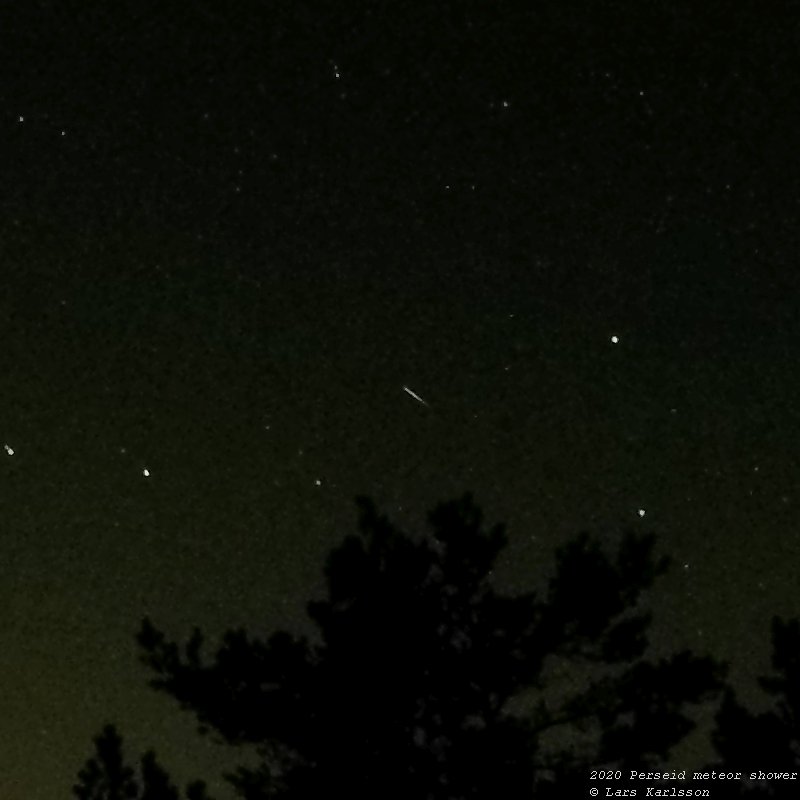
This looks like a meteor, the direction is not exactly from the Perseid cluster.
|
| Coordinates/Direction : | Perseids |
| Object size : | all sky, 180 degree diagonal |
| Object magnitude : | |
| Object : | targetting for the Perseid Meteor Shower |
| Date : | 2020-08-15 |
| Time (UT) : | 20:15:33 to 22:53:42 |
| Mount : | Tripod |
| Guide : | - |
| Lens/telescope : | GoPro built in fisheye lens 3 mm, f/2.8 |
| Corrector/Barlow : | - |
| Filter : | none |
| camera : | GoPro 5 Black edition, internal intervalo meter |
| Film/CCD : | Jpg |
| Exp. time : | Each photo 20 seconds, ISO 800, six images selected from 452. |
| Image process tool : | IrfanView |
| Processing : | Crop 1:1 to 800 x 800 pixels, it gives about 35 degrees field of view. |
| Weather : | clouds in early evening and later an almost clear sky |
| Comment : |
This second night I decreased the exposure time to 20 seconds.
We saw at least five bright meteors, but we think they were not Perseids, the directions of them was wrong.
We also saw a lot of other weaker meteors, many of them could have been Perseids.
Only one of them catched on photo and another strange object that maybe is an Iridium satellite. |
| More to know : |
Wikipedia:
https://en.wikipedia.org/ wiki/ Satellite Flares |
2020-08-13:
ID 34524
21:54 UT
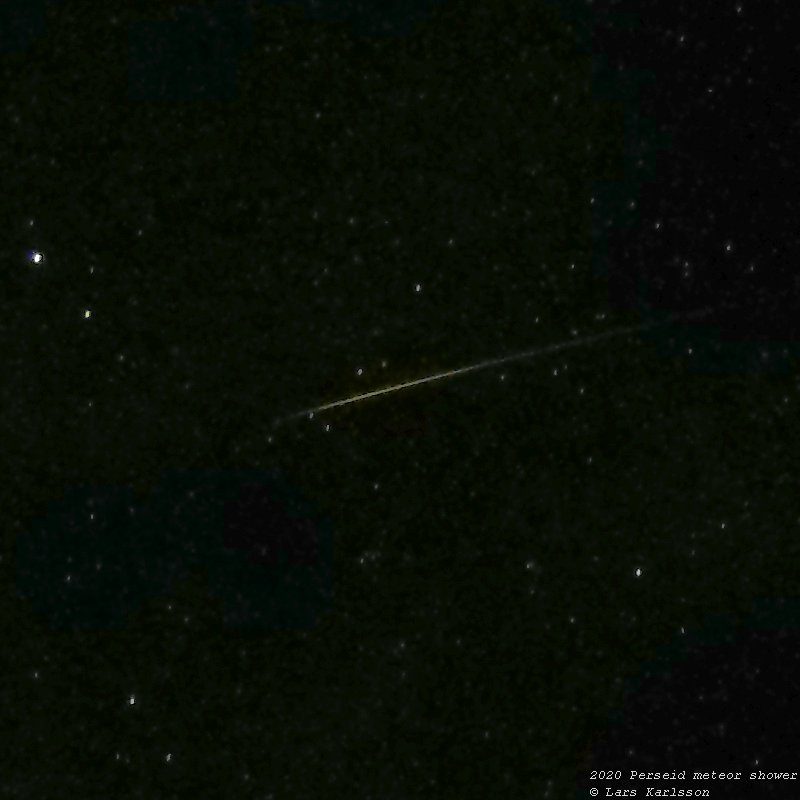
I couldn't see any Perseid meteor during the evening and night.
Later when I examine the photos I took I found the first, this is at local time 11:54 am.
It has the correct angle to be a Perseid meteor, but it's very easy by mistake have satellite trails as meteors.
|
ID 34590
22:28 UT
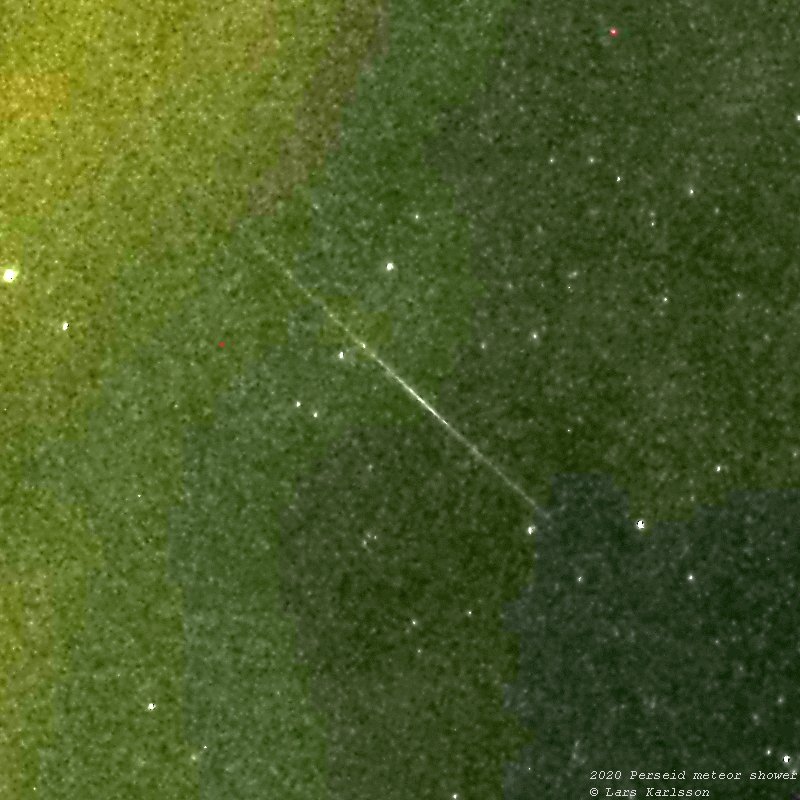
Thirty minutes later a second meteor came in, a very weak meteor.
I had to increase the contrast a lot to get it visible.
This one has wrong direction to be a Perseid meteor, it came from another place.
And of course it could be a satellite also, difficult to tell in some cases.
|
ID 34609
22:38 UT
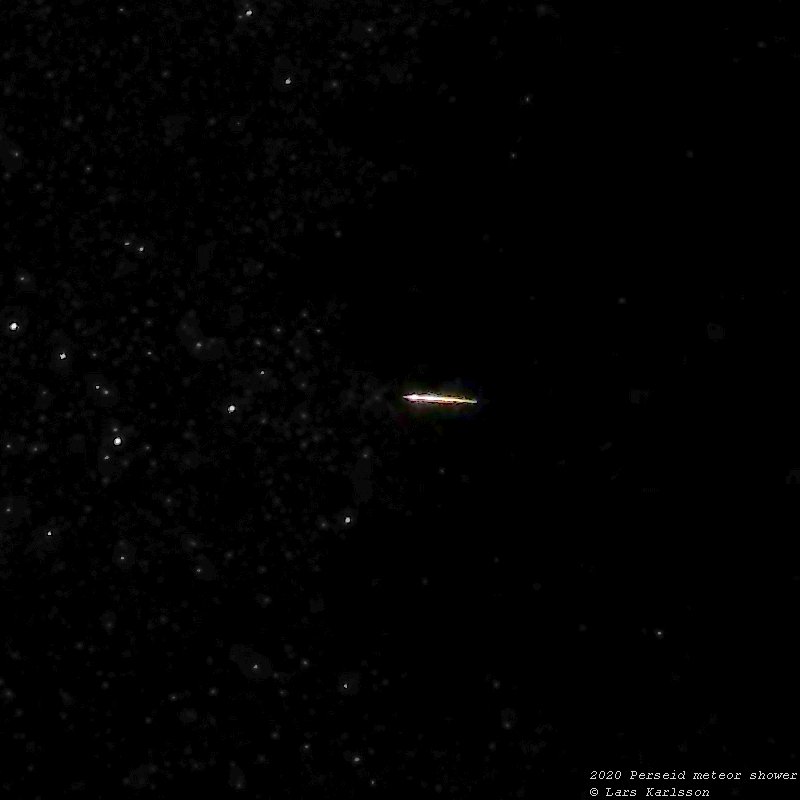
Ten minute later the brightest meteor crash into our atmosphere.
If I had looked in that direction I had seen it.
|
| Coordinates/Direction : | Perseids |
| Object size : | all sky, 180 degree diagonal |
| Object magnitude : | |
| Object : | targetting for the Perseid Meteor Shower |
| Date : | 2020-08-13 to 14 |
| Time (UT) : | 21:19:22 to 02:34:02 |
| Mount : | Tripod |
| Guide : | - |
| Lens/telescope : | GoPro built in fisheye lens 3 mm, f/2.8 |
| Corrector/Barlow : | - |
| Filter : | none |
| camera : | GoPro 5 Black edition, internal intervalo meter |
| Film/CCD : | Jpg |
| Exp. time : | Each photo 30 seconds, ISO 800, three images selected from 609. |
| Image process tool : | IrfanView |
| Processing : | Crop 1:1 to 800 x 800 pixels |
| Weather : | clouds in early evening and later an almost clear sky |
| Site : | Sweden, Norrtälje. Bortle class 4 |
| Comment : |
This time we have traveled about 100 km North of Stockholm.
When we arrived we had a lot of clouds, but at 11 am it was much better and I set up the GoPro camera.
This is the first time I used a GoPro camera for astrophotography so it's very exiting.
The day after after I have examined the photos.
Conclusion, as expected the GoPro camera is much less sensitive compare to my Canon 6D, but very practical to use and it catch the brightest meteors and stars.
Read more here how I had prepared the GoPro camera: GoPro camera |
| More to know : |
Wikipedia:
https://en.wikipedia.org/ wiki/ Perseids |








